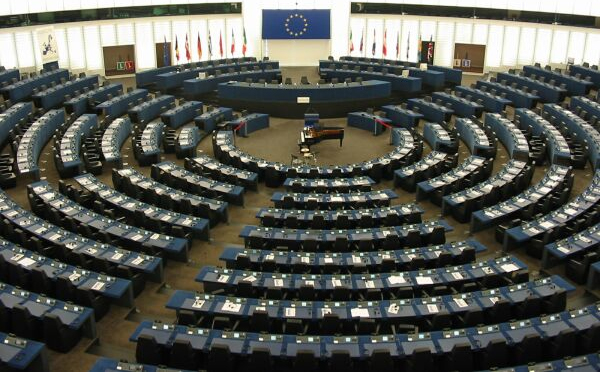
Farming groups are stepping up their fight to ensure the Common Agricultural Policy (CAP) allows farmers to compete on a level playing field across the EU.
NFU President Peter Kendall, Deputy President Meurig Raymond and senior CAP advisor Gail Soutar have met with Europe’s leading MEPs in the European Parliament in Strasbourg as part of two days’ talks yesterday and today.
They said the overriding goal was to convince MEPs to drive a policy that was 'common in name and common in nature'.
“But we are deeply concerned over UK government attempts to insert a tool into the reform package which would remove 20 per cent of farmers’ direct payments and push it into rural development funds" said Kendall.
"There would be few, if any, other member states that would make use of that tool, leaving UK farmers at a severe disadvantage."
In Octobert, farming groups from Scotland, Ireland, Portugal, Spain, the Netherlands, Belgium, France and Denmark issued a joint statement on the matter.
The statement said the "proposed swift mandatory convergence of direct support to a flat rate, be it on national, regional or sub-regional level, accelerated by the proposed flat rate of the greening scheme, threatens to destabilise the viability of certain sectors in certain regions and will bring along considerable speculation in the run up to the first allocation in 2014."
The statement was copied to Wales’ Deputy Minister for Agriculture, Food, Fisheries and European Programmes, Alun Davies AM, who is in Luxembourg.
"Our farmers need sufficient room of manoeuvre and flexibility for evolution over time. Therefore, we argue for a gradual and adequate transitional period for any adjustments and oppose the overly sharp redistribution from the start of the transition."
"On this crucial point, we urge upon our ministers to incorporate the much needed flexibility and time for the internal convergence at Member State level. We ask for a feasible and practicable result that doesn't threaten the viability of farmers in the short and medium term."
The groups warned that tight world food supplies mean that both UK and EU agricultural specialists should 'already' be planning a rise in self-sufficiency and establishing structures that avoid the risk of retail shortages.
“Current direct support levels in England and Wales are already below those of our main competitors in countries such as France, Ireland, Germany, Denmark and the Netherlands and this position must not be made worse. We are urging MEPs to overturn this measure.
“Related to this point we are asking MEPs to fight for a fairer allocation of EU money for our rural development schemes. The UK currently receives the lowest per hectare allocation of pillar two funds of all member states, which is an unacceptable position given the scale of our industry.”
Kendall said the Commission’s proposals would also have to change if the CAP budget is reduced.
“The Commission’s proposals will have to be significantly amended. If the budget is reduced, it’s only right that the conditions and costs imposed on farmers should also be reduced. We need a reality check on what we demand from farmers. We need to help them become more competitive, not force them to be more inefficient.”
With the aim of incentivising best practice in sheep health, welfare and production, the National Sheep Association (NSA) also unveiled plans that it hopes Defra will carry forward as part of their negotiations over CAP.
The new scheme will allow livestock farmers to access funding under Pillar Two of the CAP if they earn enough points from a menu of best practice initiatives, such as health planning, advisory visits from their vet, involvement in voluntary monitoring and health schemes, optional biosecurity measures and effective disease quarantine procedures.
Such measures will increase efficiency, reduce resource use and help address climate change needs.
Phil Stocker, NSA Chief Executive, launched the concept at the Sheep Health and Welfare Conference held on 21st November in Worcester.
He said: “Pillar Two of CAP already has point-based agri-environment schemes, which farmers are familiar with and utilise to farm hand-in-hand with the environment and provide a huge amount of public goods."
"NSA believes an animal health scheme along the same lines would provide much-needed funding to help farmers invest and build on the strong track-record the UK already has in animal health and welfare."
"Given the links between good health, increased production levels and reductions in carbon emissions, such as scheme would not only provide public goods in further improving health and welfare standards, but also increase output, be it meat or milk, and encourage farmers to maintain or even increase flock and herd sizes.”
Stocker said such encouragement is essential at a time when the world population and demand for food is growing exponentially, yet resource constraints and climate change are putting huge pressure on farmers around the world.
It is also particularly timely for the UK, where domestic animal health and welfare budgets are already under immense pressure and face further cuts backs as the Government’s spending review continues.
“We must take action and create this scheme under the current CAP reform,” he said.
“The UK sheep flock has shrunk significantly in recent years and the picture is similar for all other livestock sectors too."
"Any scheme that halts or reverses this trend is money well spent – and not just from an animal health and food production point of view, but also all the associated benefits provided by grazing livestock to our environment and rural communities.”
Working on this proposed scheme with Government departments in England, Wales, Scotland and Northern Ireland is a priority for the NSA, working alongside a number of stakeholder groups who have given the idea their outline support.
